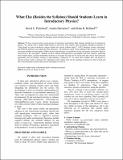What Else (Besides the Syllabus) Should Students Learn in Introductory Physics?
Author(s)
Pritchard, David E.; Barrantes, Analia; Belland, Brian R.
DownloadPritchard_What Else.pdf (791.8Kb)
OPEN_ACCESS_POLICY
Open Access Policy
Creative Commons Attribution-Noncommercial-Share Alike
Terms of use
Metadata
Show full item recordAbstract
We have surveyed what various groups of instructors and students think students should learn in introductory physics. We started with a Delphi Study based on interviews with experts, then developed orthogonal responses to “what should we teach non‐physics majors besides the current syllabus topics?” AAPT attendees, atomic researchers, and PERC08 attendees were asked for their selections. All instructors rated “sense‐making of the answer” very highly and expert problem solving highly. PERers favored epistemology over problem solving, and atomic researchers “physics comes from a few principles.” Students at three colleges had preferences anti‐aligned with their teachers, preferring more modern topics, and the relationship of physics to everyday life and also to society (the only choice with instructor agreement), but not problem solving or sense‐making. Conclusion #1: we must show students how old physics is relevant to their world. Conclusion #2: significant course reform must start by reaching consensus on what to teach and how to hold students’ interest (then discuss techniques to teach it).
Date issued
2009-07Department
Massachusetts Institute of Technology. Department of Physics; MIT Experimental Study GroupJournal
Proceedings of the 2009 Physics Education Research Conference
Publisher
American Institute of Physics
Citation
Pritchard, David E. et al. “What Else (Besides the Syllabus) Should Students Learn in Introductory Physics?” in Proceedings of the 2009 Physics Education Research Conference, Ann Arbor, MI, 29-30 July 2009. 43–46. Web. (AIP Conference Proceedings; no. 1179)
Version: Author's final manuscript
ISBN
978-0-7354-0720-6
ISSN
0094-243X
1551-7616